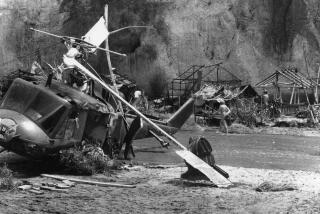BLOOD FEUD
- Share via
BAKERSFIELD — Seven-time Tour de France winner Lance Armstrong on Thursday defiantly denied charges made by disgraced former teammate Floyd Landis that he had used performance-enhancing drugs. Armstrong then dramatically crashed out of the Amgen Tour of California, caught in a tangle of at least 20 falling cyclists, leaving the race with a bloodied eye and swollen elbow.
Whether Armstrong’s reputation will withstand these latest accusations is expected to be a continuing story as he pursues an eighth Tour de France title this summer.
Johan Bruyneel, the director of Armstrong’s RadioShack team, said Armstrong tried to continue after the crash, but his left eye was swollen shut and he couldn’t put pressure on the handlebars because of his injured elbow.
After X-rays taken at Bakersfield Memorial Hospital were negative, Armstrong said in a statement, “It was one of those crashes that put a bunch of us down. I tried to give it a go, but my eye was swollen so I couldn’t see properly and the pain in the elbow prevented me from holding the bars. . . . It was a relief to learn there were no breaks.
“I will take a few days to recover and be on the bike as soon as possible.”
There was a new leader Thursday, with HTC-Columbia’s Michael Rogers taking the yellow jersey from Garmin-Transitions’ David Zabriskie. The two have the same overall time of 22 hours 56 minutes 59 seconds, but Rogers will wear the leader’s jersey Friday for the mountain stage from Palmdale to Big Bear by virtue of better placements in the first four stages.
Zabriskie was among the riders named by Landis in a story posted late Wednesday night on the Wall Street Journal’s website. Landis admitted his own use of performance-enhancing drugs but said he had sent e-mails to cycling and anti-doping officials claiming that Armstrong, three-time defending Tour of California champion Levi Leipheimer, U.S. road racing champion George Hincapie and Zabriskie schemed to engage in blood doping.
“I have nothing to hide,” Armstrong said before Thursday’s stage. “I think history speaks for itself here.
“I would say I’m surprised, but I’m not,” he said, adding that he and Landis had exchanged e-mails and text messages for nearly two years and that in the last month those messages had “reached a fever pitch.”
“He has no proof. It’s just our word against his, and we like our word. We like where we stand.”
Said Bruyneel: “Floyd needs help. I can only speak for myself. I completely deny the allegations. The ones against me are categorically false. What kind of credibility does Floyd have after telling another story for four years?”
Leipheimer, meanwhile, ignored shouts from reporters as he pedaled to the start line.
Zabriskie also refused to discuss the accusations, saying only, “Today was another beautiful stage. Everyone rode an aggressive race and unfortunately we lost a few guys from the peloton.”
Even before Armstrong crashed four miles into the 121.5-mile stage, the charges by Landis had cast a pall over the Tour of California, although Andrew Messick of tour sponsor AEG was eager to move on.
“We don’t know what to believe,” he said. “These are incredibly serious allegations against people who are riding our race. And it seems there is no real evidence in these allegations. We are awaiting something we can react to, other than an accusation by somebody who clearly has an agenda.”
In one of the e-mails, which was seen and confirmed by The Times, Landis detailed consistent use of the red-blood-cell booster erythropoietin, or EPO, as well as testosterone, human growth hormone and blood transfusions. Landis claimed he first used EPO in 2003 while riding with Armstrong on the U.S. Postal Service team in the Tour of Spain and that he obtained the drug from Armstrong.
In an interview with ESPN, Landis said, “I take responsibility for all the stuff I did. No one gave me something and said, ‘Don’t ask what this is, just take it.’ I would never have done that.”
Landis, who won the Tour de France in 2006 while riding for the Swiss-based Phonak team, accused that team’s manager, Andy Rihs, of helping riders use performance-enhancing drugs.
Repeated attempts to reach Landis went unanswered but Rihs, who now owns Hincapie’s BMC Racing team, denied the allegations. “Neither I nor the management of the team knew that Floyd Landis was doped,” Rihs said.
In a statement, Hincapie said, “I have been a professional on the circuit for 17 years. . . . During that time I have earned the respect of my peers and a reputation for working hard, honestly and honorably. I’m really disappointed to hear these accusations.”
Meanwhile, the International Cycling Union (UCI) rejected Landis’ accusations. In particular it refuted that Armstrong had tested positive during the 2002 Tour of Switzerland and that Armstrong, Bruyneel and former UCI president Hein Verbruggen conspired to keep that result secret. The cycling union pointed out that Armstrong didn’t compete in the event.
For years, Landis had fought the charge that he failed a drug test while riding to the 2006 Tour de France championship, taking his appeal to the Court of Arbitration for Sport. He ultimately served a two-year suspension and wrote a book in which he asserted that he had never used performance-enhancing drugs.
twitter.com/mepucin
More to Read
Go beyond the scoreboard
Get the latest on L.A.'s teams in the daily Sports Report newsletter.
You may occasionally receive promotional content from the Los Angeles Times.









